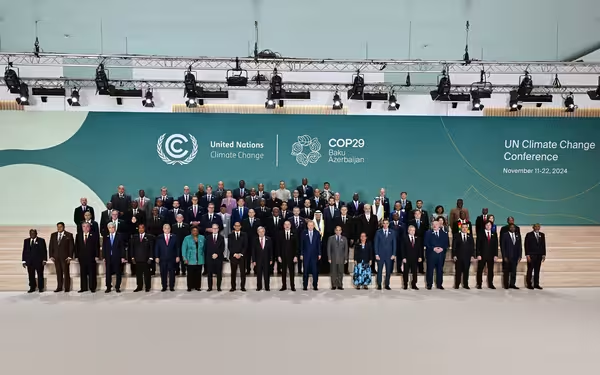Saturday, November 16, 2024 07:34 PM
World Leaders Convene in Baku for COP29 Climate Conference
- UN Secretary-General warns of climate crisis urgency.
- Key leaders absent from crucial climate summit.
- Developing nations demand increased climate financing.
 Image Credits: arabnewspk
Image Credits: arabnewspkWorld leaders gather in Baku for COP29, addressing urgent climate change issues and the need for increased funding for developing nations.
World leaders have gathered in Baku, Azerbaijan, for the 29th Conference of the Parties (COP29) to the United Nations Framework Convention on Climate Change. This important event aims to address the pressing issue of climate change, which poses a significant threat to our planet. As the world faces rising temperatures and extreme weather events, the urgency for action has never been greater. UN Secretary-General Antonio Guterres has emphasized that we are in the "final countdown" to limit global temperature rise to 1.5 degrees Celsius, warning that 2024 is "almost certain" to be the hottest year on record.
Despite the significance of this summit, many key leaders from major countries are notably absent. Notable figures such as US President Joe Biden, China's Xi Jinping, India's Narendra Modi, and French President Emmanuel Macron are missing from the event. This absence raises questions about the commitment of these nations to tackle climate change effectively.
The primary focus of COP29 is to secure a robust agreement to enhance funding for climate action in developing countries. African leaders have taken the opportunity to showcase their national initiatives aimed at promoting climate stability and economic growth. For instance, Ethiopian President Taye Atske Selassie highlighted his country's achievement of planting 40 million trees, which has increased forest coverage to 23.6 percent. He urged the international community to support Ethiopia's green legacy and land restoration efforts.
In Tanzania, Vice-President Philip Mpango pointed out the severe economic impact of climate change, stating that his country is losing 2 to 3 percent of its GDP annually due to climate-related damages. He estimated that Tanzania will require $19.2 billion by 2030 to meet its climate adaptation goals. Similarly, Tiemoko Meyliet Kone, the Vice President of Cote d'Ivoire, warned that without bold initiatives, his country could face a 13 percent drop in GDP by 2050, pushing nearly 2 million people into poverty.
The financial aspect of climate action remains a significant barrier for many nations, particularly underdeveloped ones. The President of the Maldives, Mohamed Muizzu, stressed that small island developing states require financing in trillions rather than billions to meet their climate goals. He stated, "It is the lack of finance that inhibits our ambitions," highlighting the need for a comprehensive financial strategy at COP29.
Leaders at the summit have called for urgent and cooperative action on climate change. Kazakhstan's President Kassym-Jomart Tokayev pledged his country's resources for the energy transition, while Serbian President Aleksandar Vucic emphasized the importance of global peace in addressing environmental crises. Zimbabwe's President Emmerson Mnangagwa urged an end to "half-measures," and Turkiye's President Recep Tayyip Erdogan discussed his country's plans to expand nuclear energy capacity by 2050.
Azerbaijan's President Ilham Aliyev defended the use of fossil fuels, stating, "This is a gift of the God," and argued that countries should not be blamed for utilizing their natural resources. Meanwhile, UK Prime Minister Keir Starmer announced a more ambitious climate goal for the UK, aiming for an 81 percent reduction in greenhouse gas emissions by 2035 compared to 1990 levels.
The Mayor of Kuala Lumpur, Maimunah Sharif, raised concerns about plastic pollution, warning that by 2040, 1.3 billion tons of plastic could contaminate our air, water, and food. She highlighted the alarming presence of microplastics in our bloodstream and vital organs.
In his speech, UN Secretary-General Antonio Guterres called for the dismantling of barriers to climate finance, emphasizing that developing countries must not leave Baku empty-handed. He outlined five critical elements for success, underscoring the need for equity in green technology access and stronger global solidarity.
As COP29 progresses, it is clear that the world is at a crossroads. The decisions made here will have lasting impacts on our planet and future generations. It is imperative that leaders prioritize climate action and work collaboratively to address this global crisis. The time for half-measures has passed; we must act decisively to protect our environment and ensure a sustainable future for all.













